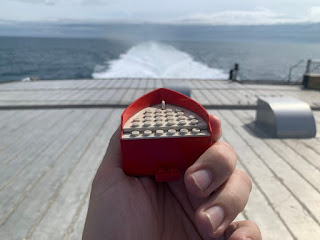Seventy five years since Wirral-born Malcolm Lowry’s acclaimed Under the Volcano was published, and 65 years since his death, this year’s Lounge explored his continuing relevance, with a look across the waters to the Isle of Man (which features in his work).
We started the day with a few quotes from Hear Us O Lord From Heaven Thy Dwelling Place, read by Cian Quayle, Jeremy Lowry (yes, Lowry), and Patricia and myself. I'm still mulling over one of the passages I read, this image of the lighthouse:
Civilization, creator of deathscapes, like a dull-witted fire of ugliness and ferocious stupidity […] had spread all down the opposite bank, blown over the water and crept up upon us from the south along it, murdering the trees and taking down the shacks as it went, but it had become baffled by the Indian reserve, and a law that had not been repealed that forbade building too near a lighthouse, so to the south we were miraculously saved by civilization itself (of which a lighthouse is perhaps always the highest symbol)...
The Lounge comprised of presentations, discussions, films and sound recordings, including an account of the research project Hear Us O Lord From Heaven Thy Dwelling Place, led by artist Alan Dunn that reimagines Lowry through the climate crisis (and semaphore); Cian Quayle also told us about his work based on his home island, too, in relation to Lowry, and with a nod to Chris Killips's work.
There's a whole website dedicated to the AHRC project: Hear Us O Lord 2020-22 (malcolmlowry.com)
Lunch talking to Colin Dilnott and Michael Romer. Catching up.
A recorded conversation, led by Bryan Biggs and Helen Tookey, with Alberto Rebollo from the annual Malcolm Lowry Colloquium held in Cuernavaca, Mexico, was quite fascinating. His notion that the history of Mexico is a history of betrayal led him to suggest that Under the Volcano is a book of betrayals. He also read from his novel-in-progress 'about' Lowry. 
Poet Helen Tookey’s reflections on Lowry’s ‘last notebook’, written in the Lake District was wonderful, as she engaged with the materiality of this little-seen text, his underlinings about not being at home in the world anywhere (even the Lake District). Helen is the latest to fall ill with Derrida's 'archive fever'!
A Lowry audience Q&A with Michael Romer and Colin Dilnott was a fine ending. 'Which character,' they were asked, 'in The Volcano would you like to be?' I muttered 'The dog!' to Patricia; Colin said 'The Dog! (and Cian thought 'The dog!' he confirmed later.)
The traditional mescal toast to 'Malcolm' finally followed.
Patricia and I had a drink and chat (not all Lowry-related!) with Michael and Cian - and a longer one in The Lion with Cian after, which was a nice way to end the day.
Some previous years are accounted for on this blog (not quite in order!) and in different levels of detail:
https://robertsheppard.blogspot.com/2009/09/malcolm-lowry-from-mersey-to-world.html
https://robertsheppard.blogspot.com/2019/03/forty-years-ago-i-visited-malcolm.html
https://robertsheppard.blogspot.com/2012/10/malcolm-lowry-and-david-markson-events.html
https://robertsheppard.blogspot.com/2014/10/malcolm-lowry-iain-sinclair-in.html
https://robertsheppard.blogspot.com/2016/10/robert-sheppard-lowry-lounge-at-lowry.html
https://robertsheppard.blogspot.com/2017/07/the-firminists-malcolm-lowry-conference.html







